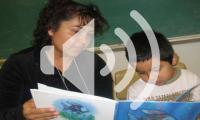
Maki Park
Senior Policy Analyst
Maki Park is a Senior Policy Analyst for Early Education and Care at the Migration Policy Institute’s National Center on Immigrant Integration Policy, where her research focuses on issues affecting Dual Language Learners (DLLs) and immigrant families in early childhood systems. Additionally, Ms. Park provides technical assistance to state and local actors, supporting their efforts to work collaboratively across local communities to address program quality and access issues facing immigrant and refugee families in home visiting, child care, and pre-kindergarten systems.
|
Media Requests General Inquiries |
Previously, Ms. Park worked as Director of Outreach and Program Manager at WorldTeach, based at Harvard's Center for International Development, where she oversaw recruiting and admissions operations and managed the organization's program in Guyana. She has also worked as an education consultant in Malawi and served as a Peace Corps Volunteer in Turkmenistan.
Ms. Park holds a master's in international education policy from Harvard University's Graduate School of Education, and earned her bachelor's degree with a double major in French and government with a concentration in international relations from Cornell University. She also practices as a clinical mental health counselor.
Bio Page Tabs
The authors of the report "Immigrant Parents and Early Childhood Programs: Addressing Barriers of Literacy, Culture, and Systems Knowledge" discuss their findings on this webinar. They and other presenters detail the experiences and challenges faced by early childhood programs and immigrant and refugee parents as they connect with one another.
Pages
Recent Activity
Enactment of the Every Student Succeeds Act (ESSA) in 2015 introduced opportunities to use federal funds to strengthen the early childhood education and care (ECEC) workforce as a means of better meeting the needs of the growing and increasingly diverse young child population.






Apprenticeship Programs Are a Promising Solution to Bring More Multilingual Workers into Early Childhood Field
Opportunities Exist to Better Reach Dual Language Learner and Immigrant Families through Home Visiting Programs